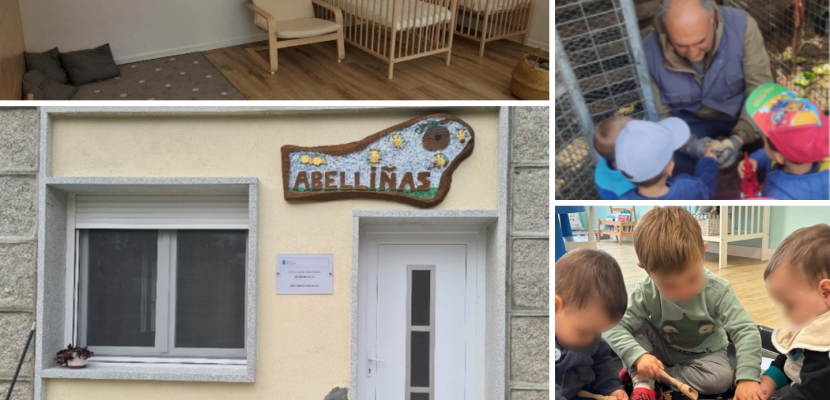
Nest homes in Galicia

About this good practice
This good practice addresses rural depopulation and land abandonment, which increases environmental risks like wildfires. Depopulation and land abandonment create a vicious cycle of interrelated challenges that affect both environmental security and economic development. Retaining population in key rural sectors is crucial to stop environmental deterioration and preventing natural disasters. The practice contributes to this goal by creating job opportunities and alternative ways to provide essential public services.
Specifically, the initiative offers a childcare solution for families with children in depopulated areas by providing public aid to freelance professionals or cooperatives in rural municipalities with fewer than 5,000 habitants. The aid covers the investment costs needed to establish Nest homes, such as renovation works and equipment acquisition, as well as an annual financial contribution to support the operation of these homes. The Nest homes offer free childcare from Monday to Friday, for up to 8 hours a day, 11 months a year, providing care for children aged 0-3 years old, living in the same or neighbouring municipalities. This care includes attention to children's basic needs for food, hygiene, and rest according to their age.
By facilitating childcare, the initiative enables families to remain in rural areas, reducing land abandonment and helping to prevent landscape degradation.
Resources needed
For each Nest home, the Xunta de Galicia provides:
- Grant for building renovation & equipment: 15,000€
- Grant for the provision of services for the incumbent of each Nest-home: 21,560€/year for new ones, 24.200€/year for those who have been active for >3 years.
Total budget : 19,112,826 €
Evidence of success
The initiative started as a pilot action in 2016 with 25 Nest homes. Since then, applications for new Nest homes are received every year. A total of 103 Nest homes are currently active throughout the rural territory of Galicia where other childcare options were not available. The initiative has proven particularly successful in the inland provinces (Ourense and Lugo), the most affected by depopulation challenges. Thus, out of the 103 active Nest homes, 51 are located in Ourense and 27 in Lugo.
Potential for learning or transfer
The initiative has proved useful in tackling challenges common across European rural areas such as depopulation and ageing population. It provides childcare services in areas where the lack of services jeopardizes work/life balance for younger people of working age, that otherwise would be forced to move out to other (generally more urban) areas.
The potential for transferability to any other region facing similar challenges is also proved by the fact that the Galician Nest homes initiative draws on the experience of other existing initiatives across Europe, such as the tagesmutter in Germany, the mamans de jour in Switzerland, the assistantes maternelles in France and “childminders” in the United Kingdom. Similar initiatives exist also in other regions of Spain, including in Madrid and Navarra, demonstrating the capacity of the initiative to be implemented in different contexts.
Further information
Good practice owner
You can contact the good practice owner below for more detailed information.
